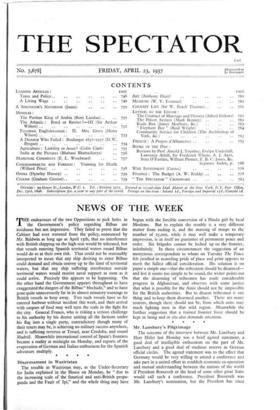Disarmament in Waziristan The trouble in Waziristan may, as the
Under-Secretary for India explained in the House on Monday, be " due to the increasing scale of the fanatical and anti-British propa- ganda and the Faqir of Ipi," and the whole thing may have begun with the forcible conversion of a Hindu girl by local Moslems. But to explain the trouble is a very different matter from ending it, and the massing of troops to the number of 25,000, while it may well make a temporary impression, is in itself no guarantee of permanent peace and order. Six brigades cannot be locked up on the frontier, indefinitely. In those circumstances the suggestion of an anonymous correspondent to whom on Tuesday The Times felt justified in according pride of place and print appears to merit the fullest official consideration. His solution is on paper a simple one—that the tribesmen should be disarmed— and lest it seems too simple to be sound, the writer points out that the disarming of tribesmen has made considerable progress in Afghanistan, and observes with some justice that what is possible for the Amir should not be impossible for the British authorities. But to disarm tribesmen is one thing and to keep them disarmed another. There are many sources, though there should not be, from which arms may reach fighting men in that wild region. Meanwhile the furthur suggestion that a trained frontier force should be kept in being and in situ also demands attention. * * * *










































